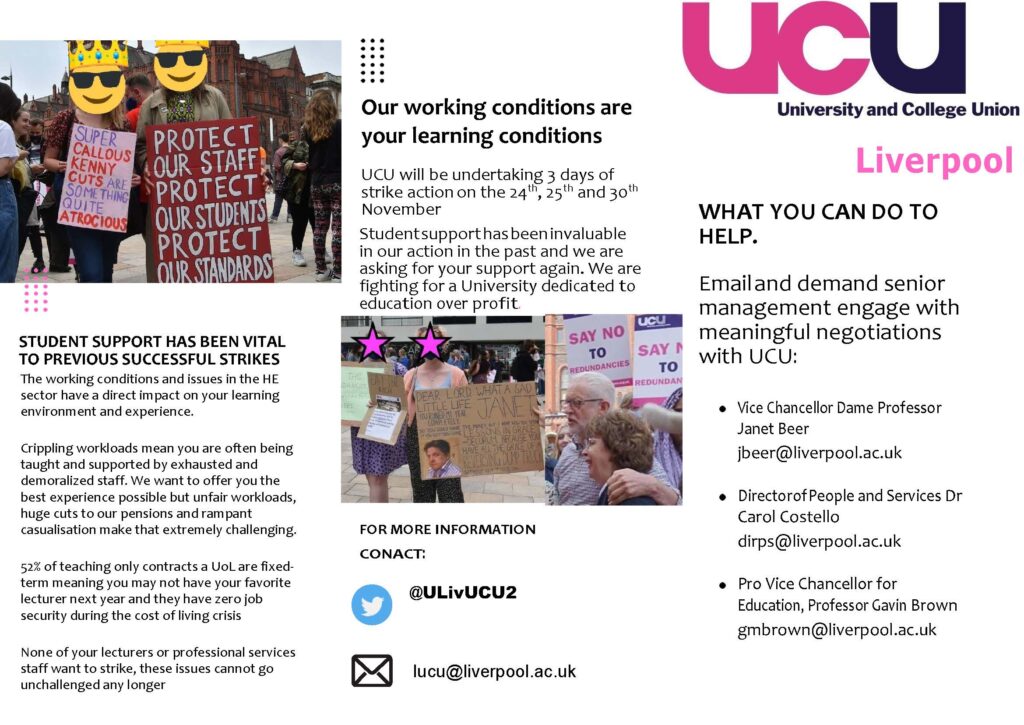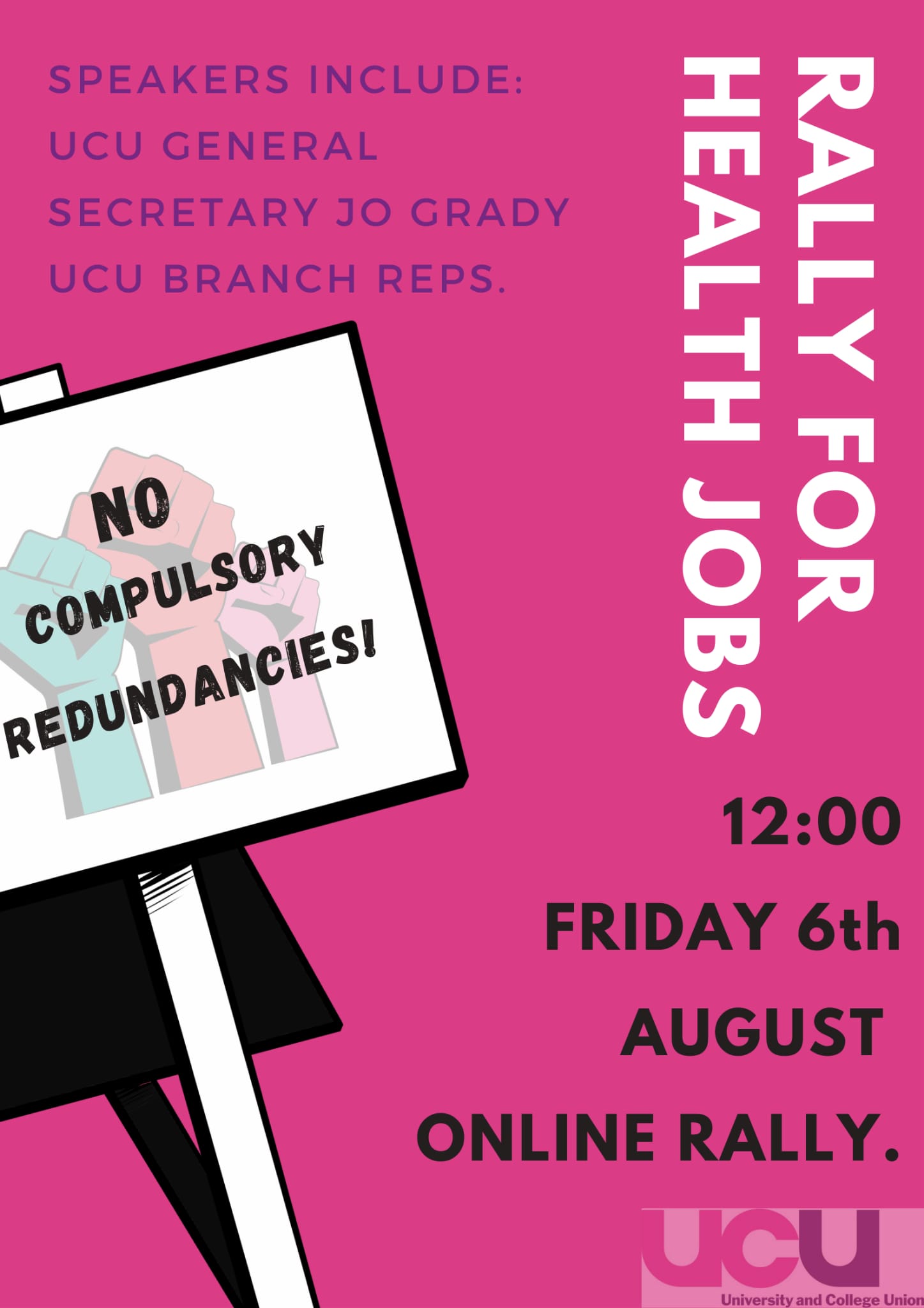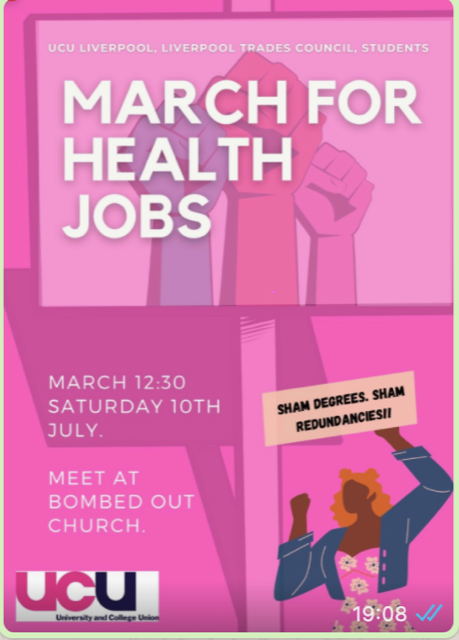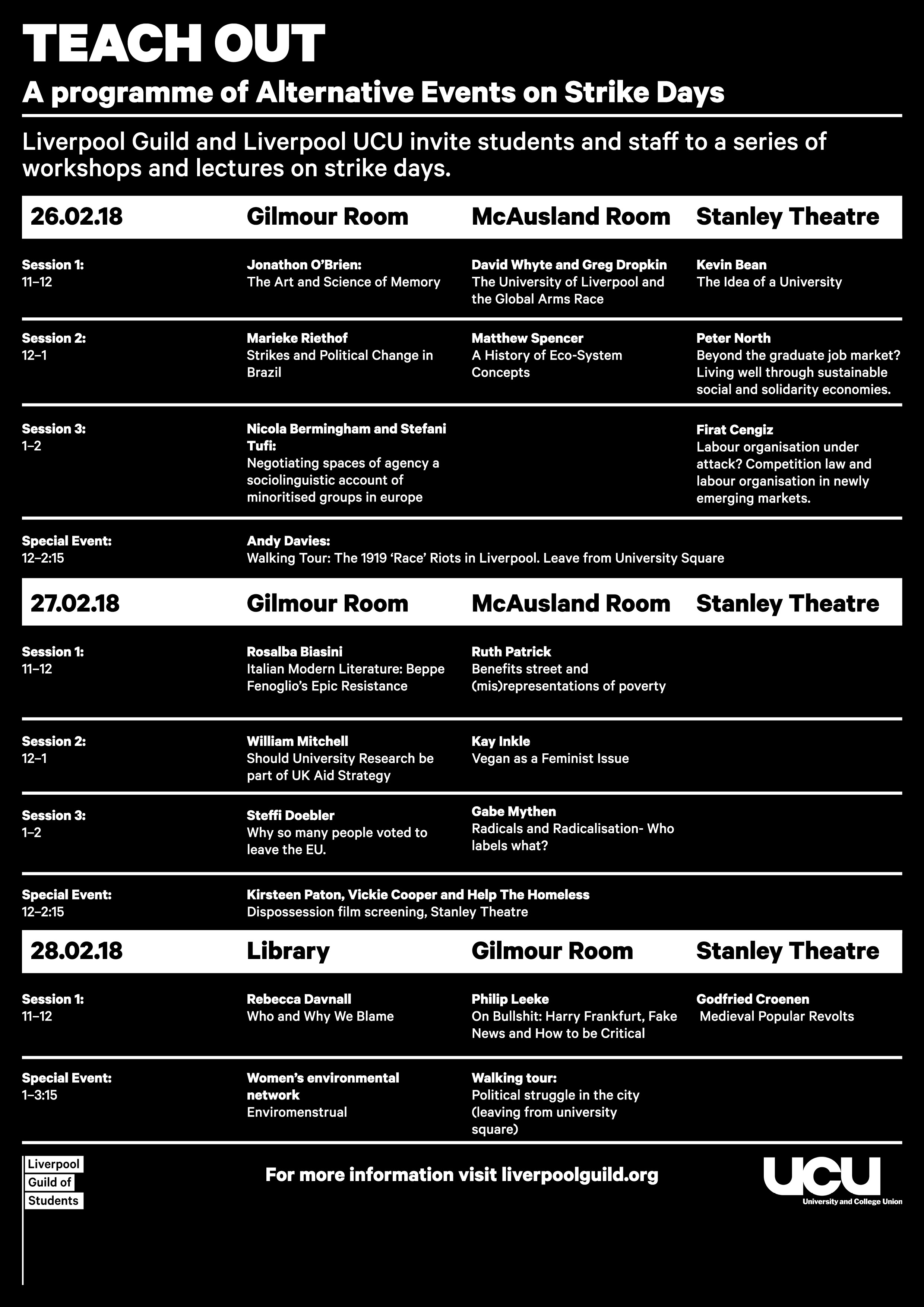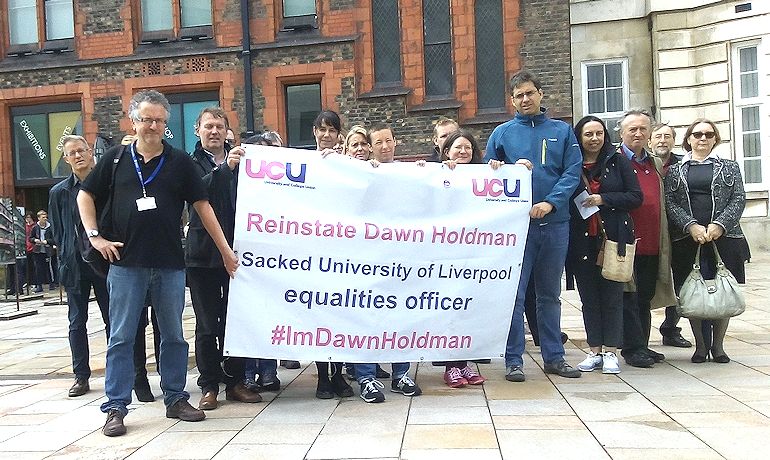UNIVERSITY OF LIVERPOOL
UCU, UNISON AND UNITE
ANTI-CASUALISATION CLAIM
- Formal Heads of Claim
The persistent and structural use of insecure contracts in higher education has become a pressing issue of contention between employers and employees over the last five years. March 2020 leaked minutes from a meeting of the Russell Group suggested that member institutions, including the University of Liverpool, ‘show leadership’ on the issue of casualisation in order to ‘avoid reputational damage’.(1)
HESA data for the most most recent publicly available academic year, 2019/20, shows that 37% of all academic staff employed at the University of Liverpool have a fixed-term contract.(2) For those of us with direct experience of insecure contracts in Higher Education, the detrimental impact of precarious employment is an ever present feature of our work. Research has shown how short-term teaching contracts mean that research and teaching staff work unpaid over periods of unemployment during the summer months. UCU has found that on average hourly paid and part-time teachers are doing 45% of their work without pay.(3)
Precariously employed lecturers have to take up positions at short notice, have little time to prepare for courses assigned to them, and are given no extra time or remuneration for their preparation and office hours workloads. The mobility and insecurity of workplace precarity has a disproportionate impact upon those academics, overwhelmingly women, who have caring responsibilities, threatening to lock them into the least recognised, remunerated and most insecure, teaching-only roles within the University.(4)
Frequent breaks in contract and changes in location disproportionately impact staff with caring responsibilities, disability or migrant workers from ‘third countries’ not granted the ‘right to remain’.
Such conditions not only have an immediate, detrimental impact upon the quality of teaching, but produce broader discontinuities in course offerings, syllabi, and one-on-one mentoring that negatively affect the student experience.
The Covid-19 pandemic has shone a light on an employment model at the University that allows fixed term contracts, particularly of teaching staff to expire during the summer with no guarantee of renewal. While a substantial number of fixed term contracts that expired in summer 2020 were renewed for 2020/21 this yearly churn is not a sustainable business model and all too often exploits the most precarious. Those staff whose contracts are up for renewal all too often carry out huge quantities of unpaid labour out of fear of not being rehired for the following year. A system that recruits teaching staff based on yearly undergraduate recruitment numbers entrenches workplace insecurity, casualisation and inequality while undermining students’ quality of learning.
Early and mid-career researchers have reported the damaging effect of short-term contracts upon their capacity to deliver ‘research excellence’. The demands of short term employment, and the requirement to move cities, institutions, or even countries at short notice has a detrimental impact on researchers’ mental health and wellbeing, as it puts in jeopardy their ability to plan their future.
One Wellcome Trust report found that 36% of surveyed researchers were considering leaving the sector within three years, fuelling worries of a ‘loss of talent’ due to ‘increased pressures, instability and inflexibility within current career pathways and promotion criteria’.(5)
Despite the fact of bringing considerable revenue to the university, researchers are forced to juggle the publication of research findings with job applications and funding proposals, a situation that affects the quality of both.(6) Often this work takes place unpaid and between contracts. The University’s own Research in an Inclusive and Sustainable Environment (RISE) listening phase recently found that, in light of the Covid-19 pandemic, there is ‘a real appetite, particularly from early career researchers, for significant, structural changes to the research environment to facilitate more sustainable and inclusive working practices’.(7)
The situation over the last year has been demoralising, particularly as the University is aware of it, and has the power to change it.
It is in the interests of the University to review its employment practices particularly in relation to fixed term contracts for staff across all roles and grades. The University is the second largest employer in the Liverpool City Region and should act as a model for fair employment, particularly given its civic responsibility and the role it plays in underpinning the local economy.
Working with trade unions to address casualisation would send a strong message to staff, students and the local community that the University’s claim that it ‘supports all staff and students in maximising their potential to succeed’ is genuine.
- Statement of Intent
Our claim is for the University to commit to the following in a written public statement:
2.1. A joint review of the hourly paid and fixed-term contracts at the University
2.2. A joint review of supplier agreements issued by the University and by third parties engaged with the University
2.3. Time-limited discussions regarding the issue of casualisation
2.4. A review of agreed role profiles for hourly paid and fixed-term employees across the University
2.5. The University to provide sufficient resources (people and funds) to achieve this objective in a timely and consistent way
- Ending the Unjustified Use of Fixed Term Contracts
In addition, the university should agree steps, including:
3.1. A commitment to indefinite contracts as the general form of employment at the University, with clearly defined conversion targets and timetable;
3.1.1. The joint trade unions will work with management on the process of implementation.
3.2. The transferral of all hourly paid and fixed term employees onto indefinite (and/or fractional) contracts with the exception of the following specific circumstances in which fixed term contracts are permitted:
3.2.1. Cover for a temporary absence, such as maternity/adoption/paternity/shared parental leave, sickness absence, bereavement and care leave, secondment, academic research and education leave;
3.2.2. Recognised, time-limited training programmes (e.g. Graduate Teaching Assistantships);
3.2.3. Cover for unexpected, temporary, one-off peaks in demand where the contract will end when the demand returns to normal levels. It is not permitted that such cover is repeated year-on-year as is currently the case, as predictable increases in activity and recruitment should require indefinite contractual arrangements;
3.2.4. Where individuals specifically request to be placed onto, or remain on, a fixed term contract;
3.2.5. Following Ball vs University of Aberdeen (2008), time limited external funding is not in itself a sufficient ground to refuse a permanent contract.(8)
3.3. Minimum length of 12 months to be introduced for all temporary contracts.
3.4. The elimination of the use of zero hours contracts at the university. All staff employed on zero hours contracts will be transferred onto indefinite fractional arrangements with the exceptions of the circumstances outlined in 3.2.1. – 3.2.5.
- Ending the Use of Supplier Agreements
This claim aims to prevent the use of supplier agreements for academic, academic support and professional service work at the university. The joint trade unions are aware that the University has issued supplier agreements to staff undertaking doctoral supervision for the online PhD in Education. At a time when such employment practices are being regularly denounced and in light of the recent Uber ruling,(9) this is a particularly retrograde step from the University and should be revoked immediately. The University should agree steps to ensure:
4.1. An end to the contracting of academic, academic support and professional service work through supplier agreements and other ‘freelance’ arrangements at the university;
4.1.1. All those who conduct such work are granted employee status at the university;
4.1.2. A review of supplier agreements issued both directly by the University and by third parties the University engages.
- Regularising the Permanency Process
It is our intention that this agreement address the significant workload faced by HR employees and joint trade union representatives when dealing with outstanding claims to permanency. To this end, the University should agree steps to ensure:
5.1. All full or part time fixed-term positions to be reviewed after two years, and the contracts to be made permanent at this point, unless their role meets the criteria set out in section 3.2.;
5.2. The automatic conversion to indefinite contracts for all those who have been working at the university for four years on a continuous basis.
- Tackling Researcher Insecurity
Our claim is to ensure security and career progression for all Research Associates and Assistants at the university, regardless of whether they are externally or internally funded. The university should agree to the following steps:
6.1. Full time employment to be the general and default form of contract for all Research Associate and Assistant positions.
6.2. Part-time contracts should be optional for those who wish to choose them
6.3. Bridge funding of up to a year to be made available to Research Associates and Assistants at the conclusion of their employment(10)
6.3.1. This funding will be provided for the purpose of completing publications, writing follow up funding applications, and seeking new employment within or outside the University
6.3.2. This funding will be provided by the university directly or by funding bodies (as part of the initial project proposal)
6.4. The prospect of permanency should be discussed between funders, PIs and HEIs at both an early stage and the conclusion of the funding period
6.5. A minimum employment period of 2 years for all research associate/assistant contracts
6.5.1. External funding will not be deemed a sufficient reason for contracts of less than two years in length
6.5.2. Bridge funding can be used to extend contracts where external funding has ended
6.6. Commit to a clear plan for the allocation of workload between PI, Co-Is, and Research Associates and Assistants
6.7. PIs should not be the only line managers and decision-makers. A good structure of support with at least two line managers and a mentor are to be offered to each researcher. Research Associates and Assistants must be fully integrated into the University’s HR processes.
6.8. Commit to a citation ethics model to ensure early career researchers are credited for their work
6.8.1. A clear plan for the fair allocation of single and collectively authored work to be agreed upon at the project planning stage.
6.9. In all Research Associate and Assistant contracts allocate as standard, and in accordance with the Research Concordat, a minimum of 10 working days per year for postdoctoral researchers to develop their independent research profiles, of at least 0.1FTE, to be taken either on a weekly basis or in larger blocks.
6.10. Ensure that all Research Associates and Assistants are HERA scored.
6.11. Ensure that the university covers relocation costs for all Research Associate and Assistant Positions
- Ending the Unequal Treatment of Hourly Paid Teaching and Research Staff
Of those hourly paid roles that remain as part of the agreement, the university should agree steps, including:
7.1. Ensuring agreement with UCU representatives on all job roles and specifications across the University that are outside of the 2004 Framework Agreement Role Profiles;
7.2. Ensuring that all Postgraduate Teaching Assistants, Demonstrators, Hourly Paid Lecturers, and University Teachers are paid equally, and in accordance to pay grade, for the same activities across all Schools, Departments, and Services;
7.3. Ensuring equal access to incremental progression for all staff on different forms of contract;
7.4. Reviewing the grades paid across schools, departments, and services to ensure compliance with other agreements;
7.5. Ensure equal access to paid time for professional development opportunities.
- Tackling Graduate Teaching Assistant and Postgraduate Demonstrator Insecurity
The university should agree steps, including:
8.1. Employee status for all Graduate Teaching Assistants
8.2. Guaranteed minimum and maximum working hours across all University departments for all students employed on GTA or Demonstrator contracts;
8.3. Postgraduates employed on GTA or Demonstrator contracts to be paid for a minimum of 2 office hours/tutorial time per week;
8.4. All postgraduates employed on GTA or Demonstrator contracts to be paid for any lectures they attend that are connected to the courses they teach;
8.5. Standardise pay grades, including marking tariffs, across departments at the university for all GTAs and Postgraduate Demonstrator positions;
8.6. Guaranteed paid preparation time for all GTA and Demonstrator contracts;
8.7. Guaranteed access to the relevant teaching qualification, free of charge (e.g. Postgraduate Certificate for Teaching and Learning in Higher Education or the Advanced HE Programme).
- Ensure Adequate Facilities Time
9.1. Joint trade union representatives, particularly those on casualised contracts, will have to dedicate significant time in order to undertake trade union duties to develop, negotiate and implement this claim. Our claim includes a call for agreement on additional facilities time for the joint trade unions to negotiate and implement this claim. Agreement to this would serve to demonstrate the University’s commitment to addressing casualisation.
- Negotiating Forum
10.1. The joint trade unions submit this claim as a matter for collective bargaining under Section 178 (2) (a) of the Trade Union and Labour Relations (Consolidation) Act 1992 ‘terms and conditions of employment, or the physical conditions in which any workers are required to work’ and 4.3 of the University Recognition and Facilities Agreement. (11) Negotiations should therefore be held between representatives of the joint trade unions and University management alone. It is essential that these negotiations take place in a timely and transparent fashion and that the objective should be to reach agreement by the end of the Summer Term 2021, with implementation beginning in Autumn 2021 at the earliest and January 2022 at the very latest. Agreement will be conditional upon the establishment of a clear and fair timeline of implementation.
References
- https://www.timeshighereducation.com/news/tackling-use-fixed-term-contracts-priority-russell-grouphttps://www.ucu.org.uk/media/10760/RG_casualisation_meeting_minutes_March_2020/pdf/RGcasuali[1]sationmeetingminutesmarch2020
- https://www.hesa.ac.uk/data-and-analysis/staff/employment-conditions
- https://www.ucu.org.uk/media/10336/Counting-the-costs-of-casualisation-in-higher-education-Jun-19/pdf/
ucu_casualisation_in_HE_survey_report_Jun19.pdf . p.4.
- See Theresa O’Keefe and Aline Courtois. ‘“Not One of the Family”: Gender and Precarious Work in the Neoliberal University’. Gender, Work & Organization 26, no. 4 (2019), pp.463–79.
- https://wellcome.org/reports/what-researchers-think-about-research-culture
- The Precarious Postdoc: Interdisciplinary Research and Casualised Labour in the Humanities and Social Sciences
- University of Liverpool, Research in an Inclusive and Sustainable Environment, report of the listening Phase(2020), https://www.liverpool.ac.uk/intranet/media/intranet/humanresources/academy/research/
- Fixed term contracts and UCU sponsored employment tribunal case RISE_Report_Final.pdf, p.3.
- Uber BV and others (Appellants) v Aslam and others (Respondents) – Press Summary
- At the University of Leeds and Birkbeck, University of London, Institutional Strategic Support Funding (ISSF) from Wellcome Trust has been used to create bridge funding for postdoctoral researchers in the Medical Humanities. See https://wellcome.org/what-we-do/our-work/institutional-strategic-support-fund
- Trade Union and Labour Relations (Consolidation) Act 1992






